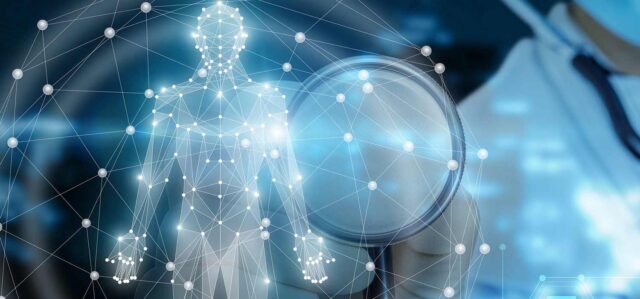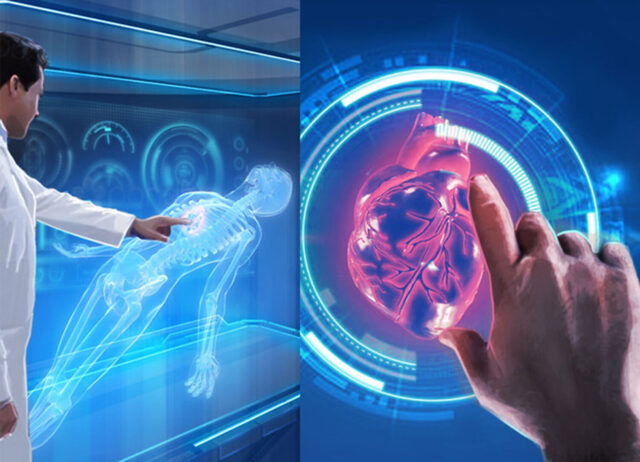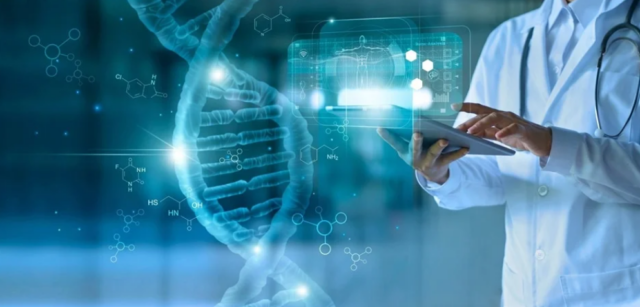
The intersection of artificial intelligence (AI) and healthcare is paving the way for groundbreaking advancements, particularly in the realm of medical diagnosis. With the critical role that timely and accurate diagnoses play in healthcare outcomes, the potential of AI to transform this area cannot be overstated.
AI’s integration across various fields has demonstrated its capability to enhance efficiency and precision, hinting at a future where it could be instrumental in diagnosing diseases. This blog post delves into the transformative power of AI in medical diagnostics, exploring its benefits, challenges, and the ethical considerations it brings.
Traditional Methods of Medical Diagnosis

Traditionally, medical diagnosis has relied heavily on the clinical acumen of healthcare professionals, supported by a range of diagnostic tools and tests. From physical examinations to laboratory tests and imaging techniques, these methods have formed the backbone of identifying and treating diseases. However, these conventional approaches often face limitations in terms of accuracy, timeliness, and efficiency. The complexity of human biology and the subtleties of many diseases demand more sophisticated diagnostic capabilities, highlighting the need for advancements that can overcome these hurdles.
The Rise of AI in Healthcare
The integration of AI into healthcare represents a significant leap forward in addressing the limitations of traditional diagnostic methods. AI’s ability to analyze vast amounts of data with unparalleled speed and accuracy has found applications in medical imaging, pattern recognition, and the analysis of complex datasets. This not only enhances the ability to diagnose diseases accurately but also improves the overall efficiency of healthcare delivery. The benefits of artificial intelligence in healthcare are manifold, ranging from improved diagnostic accuracy to the potential for personalized treatment plans. People such as Munjal Shah, who is an entrepreneur and the co-founder and CEO of Hippocratic AI, are those who are leading the charge on this battlefield of progress in AI appliance in medicine.
How AI is Changing Medical Diagnosis
AI algorithms excel in analyzing large datasets, a capability that is particularly valuable in medical diagnosis. There are now numerous examples where AI systems have outperformed human experts in diagnosing certain conditions, such as skin cancer or diabetic retinopathy. This shift is poised to reduce diagnostic errors significantly and improve patient outcomes. The ability of artificial intelligence to sift through and make sense of vast amounts of medical data presents an unprecedented opportunity to enhance the accuracy and reliability of medical diagnostics.
Challenges and Ethical Considerations

Despite its potential, the use of AI in medical diagnosis is not without challenges. Concerns regarding data privacy, the possibility of bias in AI algorithms, and regulatory hurdles are prominent. Ethical considerations also arise, particularly in terms of accountability for diagnostic errors made by AI systems. Addressing these challenges requires a concerted effort to ensure that artificial intelligence is used responsibly and ethically in healthcare, with mechanisms in place to protect patient data and ensure fairness and transparency in AI-driven diagnostics.
AI-Powered Diagnostic Tools
Several AI-powered diagnostic tools are already making their mark in the healthcare industry. These tools are being lauded for their accuracy, reliability, and user-friendliness, offering significant improvements over traditional diagnostic methods. Case studies from clinical settings have begun to showcase the successful implementation of these tools, demonstrating their potential to enhance patient care and streamline healthcare processes.
The Role of Machine Learning in Medical Diagnosis
Machine learning, a subset of artificial intelligence, plays a crucial role in medical diagnosis by employing techniques such as supervised learning, unsupervised learning, and reinforcement learning. These methods enable the development of algorithms that can learn from and make predictions based on data, a capability that is revolutionizing the way diseases are diagnosed. The training and deployment of machine learning algorithms in healthcare are intricate processes, but the outcomes offer promising improvements in diagnostic accuracy and patient care.
Future Trends in AI for Medical Diagnosis

The future of AI in medical diagnosis is bright, with emerging technologies like deep learning, natural language processing, and predictive analytics paving the way for further advancements. These technologies are expected to enhance the ability of AI to analyze medical data, predict disease progression, and offer personalized treatment recommendations. The ongoing evolution of artificial intelligence promises not only to transform medical diagnostics but also to foster innovation and collaboration in the field of AI-driven healthcare.
Patient Perspectives on AI in Diagnosis
Understanding patient attitudes towards AI in medical diagnosis is crucial for its successful integration into healthcare. Surveys and interviews reveal a mix of trust, acceptance, and concerns among patients, highlighting the importance of involving them in the development and implementation of AI technologies. Ensuring that patient perspectives are considered will be key to fostering acceptance and optimizing the use of AI-driven diagnostic tools.
AI and Personalized Medicine
AI is a powerful enabler of personalized medicine, offering the ability to analyze individual patient data to tailor treatments specifically. Applications in precision oncology, pharmacogenomics, and treatment optimization are illustrating how artificial intelligence can be used to improve patient outcomes and make healthcare more efficient. The potential of personalized medicine, powered by AI, to revolutionize healthcare is immense, promising treatments that are as unique as the patients themselves.
Regulatory Landscape and Policy Implications

The regulatory landscape governing the use of AI in healthcare is evolving. Current frameworks are being reassessed to ensure the safety and efficacy of AI-driven diagnostic tools, with a clear need for updated regulations. Policymakers are faced with the challenge of fostering innovation while protecting patient interests, a balance that will be crucial for the responsible advancement of AI in healthcare.
Conclusion
The potential of AI to revolutionize medical diagnosis and transform the future of healthcare is undeniable. From enhancing diagnostic accuracy to enabling personalized medicine, AI offers a myriad of benefits that could significantly improve patient care. However, realizing this potential requires addressing ethical and regulatory challenges, ensuring data privacy, and fostering patient trust. As healthcare professionals, policymakers, and stakeholders navigate these challenges, the responsible and ethical adoption of AI technologies will be paramount. The journey toward AI-driven healthcare is just beginning, and it promises to be a transformative one for all involved.









